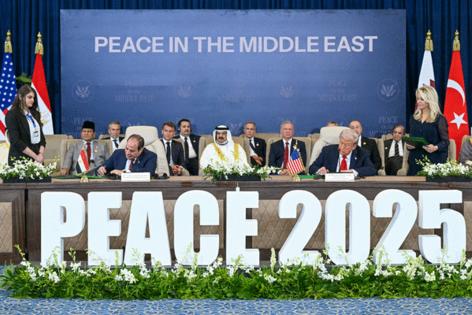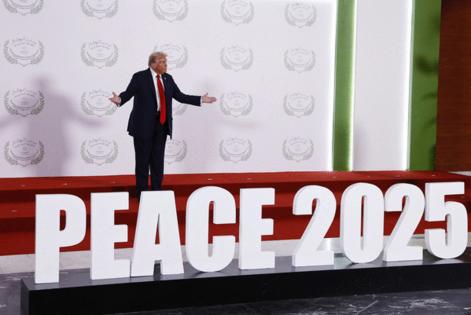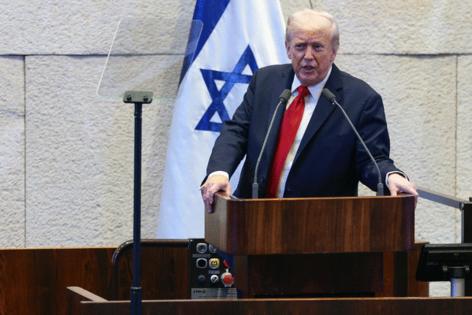Hostages freed, prisoners released, as Trump hails 'golden age' in Mideast
Published in Political News
REIM, Israel — Israelis and Palestinians cried, cheered and gave thanks Monday as Hamas militants released the last 20 Israeli hostages in exchange for more than 1,900 Palestinian prisoners and detainees.
It was the first phase of a ceasefire deal put in place last month even as President Donald Trump — the driving force behind the agreement — gave what amounted to a victory speech in the Knesset, the Israeli parliament, before departing for a peace summit in Egypt.
Greeted with a standing ovation before he said a word, Trump heralded the deal as ushering in “a golden age” for Israel and the Middle East.
“After so many years of unceasing war and endless danger, today, the skies are calm, the guns are silent, the sirens are still, and the sun rises on a Holy Land that is finally at peace,” he said.
His words belied the many complications facing an agreement that remains far from a comprehensive road map that could definitively end a war that killed tens of thousands of Palestinians and pulverized much of the Gaza Strip, even as it scarred Israeli society with the deaths of 1,200 people and brought unprecedented international condemnation of the country’s leadership.
The night before the scheduled morning handover, tens of thousands Israelis streamed into Hostages Square in Tel Aviv, as well to the roadside near southern Israel’s Reim military base, where the hostages were to be brought after their release.
A party atmosphere prevailed on the road to Reim, as Sikorsky Super Stallion helicopters landed in a dusty field to the cheers of a nearby crowd, which raised Israeli and American flags and swayed to a song whose lyrics promised, “I’m coming home, tell the world I’m coming home.”
Passing cars honked in salute, with one passenger rolling down her window and shouting, “The kidnapped are returning!”
“Since Thursday my smile has been stuck, my jaw hurts from it, after two years of not doing it at all,” said Sarit Kenny, 65, a resident of a kibbutz nearby who said she had attended a rally every week since the Hamas-led attack on Oct. 7, 2023, to call for the hostages’ return.
She pointed to the American flag in her hand, saying she wanted it to be an expression of her appreciation of Trump.
“He’s the one who actually did this. He did what our prime minister didn’t do,” she said.
Jonathan Kaneh, 46, who owned a polymer factory in the kibbutz of Orim, saw in the release a more somber moment. On Oct. 7, Hamas militants on a truck shot at him as he was riding his bicycle; the bullet grazed his arm but he was otherwise unhurt. At the same time, the war had forced him to shutter his business.
He had arrived early at the site to mark the start of the attack two years ago, which began at 6:29 a.m.
“It was important to me to come here, to close this circle. A lot of people, their lives stopped in this place,” he said, his voice turning deep with emotion.
For many others, the day represented a moment combining religion and the sense of history, with the hostages’ release falling on the religious holiday of Simchat Torah, just as their kidnapping had been on Simchat Torah two years earlier.
“It’s my luck to be here now, and most of the people are feeling same, that we had to be here,” said 70-year-old Uzi Bar-On, as he sat on a lawn chair and made coffee on a portable stove, with Jimmy, his dog, by his side.
Bar-On said that the last two years had seen him consumed with thoughts of revenge against Hamas and the people of Gaza, but that the hostage release could help Israelis to move on.
“First I want to see the hostages. When I see them with my own eyes, not through the press, then maybe I can start to think differently,” he said.
When the convoy of vans and military vehicles bearing the first group passed by, the crowd erupted in a flurry of cheers.
It seemed timed to coincide with the moment Air Force One was about to land at Ben Gurion International Airport, before Trump would be whisked away to Jerusalem to meet hostage families before his Knesset address.
Aside from touting the achievements of his administration (and impugning former Presidents Obama and Biden), Trump gave a full-throated endorsement of Israeli Prime Minister Benjamin Netanyahu, a deeply unpopular figure with many Israelis, who blame their leader for embroiling the country in the war in the first place and accuse him of prolonging it for his own political purposes.
But Trump insisted that Netanyahu did “a great job,” and diving into Israel’s domestic affairs, urged the president to pardon Netanyahu of corruption charges he’s facing. Trump also heaped praise on envoy Steve Witkoff and son-in-law Jared Kushner for their efforts in brokering the deal, while musing about the idea of Israel making peace with Iran.
Later he flew to Egypt for a summit in Sharm el Sheikh, where he met with Egyptian President Abdel Fattah Sisi and a raft of Arab and Islamic leaders to discuss the next steps for Gaza.
“We have a once-in-a-lifetime chance to put the old feuds and bitter hatreds behind us,” Trump said at the summit, which saw Sisi award Egypt’s highest civilian honor to Trump.
Netanyahu did not attend, with his office saying that the timing conflicted with the Jewish holiday.
The Trump-brokered deal stipulates Hamas will release the bodies of 28 hostages who died in captivity, with each one returned in exchange for 15 bodies of Palestinians killed during Oct. 7.
Four bodies were released Monday. In recent days, Hamas said it was facing difficulties retrieving corpses from the rubble of Gaza’s war-ravaged buildings.
A few hours after the release of the second batch of hostages, buses carrying about 1,700 Gaza residents detained in Israel without charge over the last two years left for the Palestinian enclave, along with 250 prisoners serving life sentences for convictions in attacks on Israelis.
Two busloads of 88 people were released in Ramallah, in the Israeli-occupied West Bank, where families assembled at the Ramallah Cultural Palace — a place normally reserved for performances — to greet relatives, some they hadn’t seen in decades.
When the buses arrived, Palestinian security forces tried to maintain order but were soon overwhelmed by the crowd. The prisoners and detainees emerged with their heads shaved, looking gaunt and pale in the afternoon sun — a measure, many said, of the harsh treatment they received.
Despite their joy at the release, few were willing to be interviewed, saying Israeli authorities had warned them to not celebrate or speak to the media under threat of rearrest.
“When I saw all the people here, we forgot all of our pain. But our brothers detained inside are still suffering,” said one released prisoner who had spent 20 years in an Israeli jail. One hand held a cigarette, while the other carried a phone he was using to talk to his niece for the first time.
“I’m tired, but thank God for everything,” said Yahya Nimr Ahmad Ibrahim, a Fatah member arrested in 2003 and sentenced to 23 years. Wrapped in a Palestinian black-and-white kaffiyeh, he looked frail as family members carried him on their shoulders in celebration.
The list of Palestinian detainees to be released was a point of contention up to the very last minute, according to Palestinian rights groups, which count at least 100 additional prisoners with lifetime sentences who would not be released.
The head of the Commission of Detainees’ Affairs, Raed Abu Al-Hummus, said the commission had received hundreds of phone calls from people enraged that their loved ones weren’t being released.
For others, the prisoner release was bittersweet: 154 of the 250 prisoners were to be exiled to Gaza, Egypt, Malaysia or Turkey, and with their family members subject to travel restrictions, it was unlikely they would see them anytime soon.
Elsewhere in the crowd, bewilderment laced with anger when families who had been informed that their loved ones would be released discovered they weren’t on the buses after all.
“We don’t know what happened. The Israeli army called me last night, told me my brother was coming here. They even came and smashed up our house so we wouldn’t celebrate. Then we heard he’s to be exiled, but no one knows where he is,” said Raed Imran, the brother of Mohammad Imran, a Palestinian Islamic Jihad member who was serving 13 life sentences.
Beside him was his sister, Ibtisam, crying.
“We prepared all his favorite foods, all of them,” she said, barely able to keep her voice steady from crying. “We’ve been working since two days for this moment. We even have the dishes in the car, ready for him when he came out.”
Imran began to tear up as well.
“We just don’t know. No one has told us anything,” he said.
As the afternoon sun waned, the crowd began to thin out, save for a few families asking anyone who seemed in authority to give them information about their missing loved ones. But soon enough, they too walked away.
©2025 Los Angeles Times. Visit at latimes.com. Distributed by Tribune Content Agency, LLC.





























































Comments